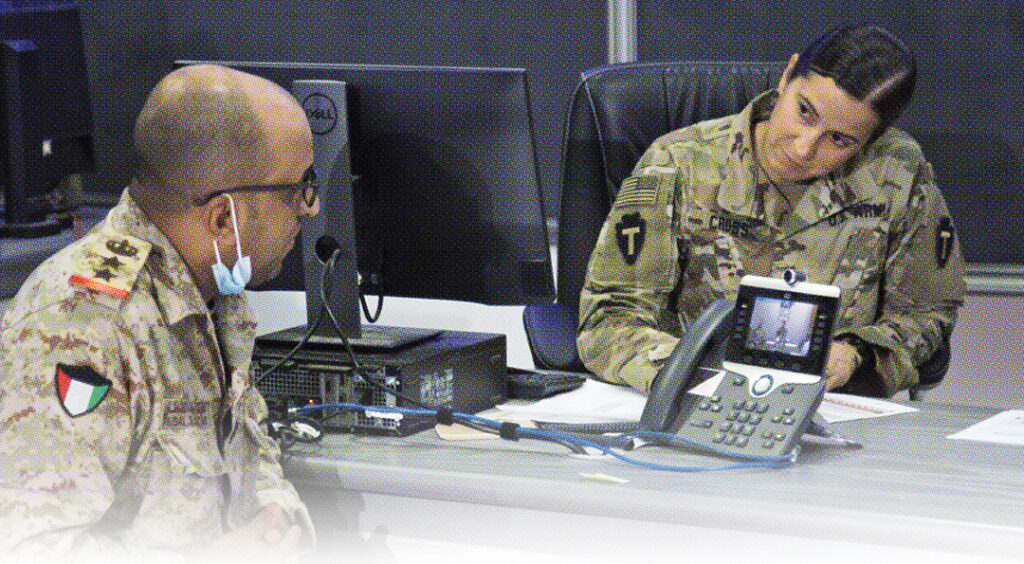COL. FAISAL Al QATTAN, DEPUTY DIRECTOR G2, KUWAIT LAND FORCES; LT. COL. LAURA CROSS, TASK FORCE SPARTAN G2;
AND LT. COL. QUENTIN MCCART, DEPUTY DIRECTOR, INTELLIGENCE SUPPORT DIVISION, THIRD ARMY/U.S. ARMY CENTRAL
Kuwait and the United States have widened military intelligence cooperation, turning what had been occasional meetings into weekly engagements that help provide security for the region.
By mid-2021, the partners announced completion of 63 bilateral intelligence engagements over a single year, most of them virtual in light of COVID 19 lockdowns. Kuwait Land Forces and U.S. Army Central (USARCENT) recognized this milestone by committing to a continuation of the successful intelligence partnership.
“Relationships matter, and COVID-19 should not stand in the way of maintaining those relationships,” said U.S. Army Maj. Gen. Patrick Hamilton, commander of Task Force Spartan, a mobile force that helps advise and train partners in the Middle East. “Knowing who to call when something goes wrong is the key to every position and relationship.”
Early in 2020, the pandemic forced cancellation of most in-person events, including bilateral exchanges. Because adversaries never take a break, Kuwait Land Forces and USARCENT’s intelligence directorate, known as the G2, realized neither partner could afford indefinite delays.
Raising levels of tactical and operational awareness is a priority if Kuwait and the U.S. are to preserve peace in the region, said Col. Faisal Al Qattan, deputy director G2 of Kuwait Land Forces.
“We must all work together to restore peace,” Col. Al Qattan said. “We have recently seen the capabilities developed by organizations considered hostile to peace in the region. These organizations are working tirelessly to obstruct all efforts made to maintain peace.”
While the Kuwaiti and USARCENT G2 relationship is not new, the commitment and consistency of this partnership is noteworthy. Increasing partner capacity and interoperability are key to the region’s success.
In the past this relationship was conducted mainly through in-person engagements of subject matter experts, leveraging forward deployed units such as Task Force Spartan G2. Symposiums were added later so that senior U.S. and Kuwaiti officers could meet their counterparts face to face.
When the pandemic struck in 2020, intelligence officers from both countries decided to continue these events virtually. The team used technology from the Coalition Partner Network to continue its fruitful collaboration. Although this platform allowed the partners to maintain communication, it created dependency on a network that sometimes became overloaded from shared use.
Regional threats made an in-person component imperative. Though augmented by virtual technology, the events emphasized face-to-face engagement. This hybrid approach, which the G2 and other warfighting sections of the U.S. military adopted as a pilot project, maximized intelligence synchronization.
Virtual augmentation of engagements was necessary because of the reduced number of USARCENT personnel allowed to travel to live events. On the plus side, such technology allowed even greater participation in the events. Organizations that had rarely participated in the past could now attend with greater ease. These weekly events became successful forums for sharing regional security concerns.
Kuwait Land Forces, USARCENT and Task Force Spartan G2 intend to broaden their relationship with future engagements, including a program called Junior Officer Professional Development.

